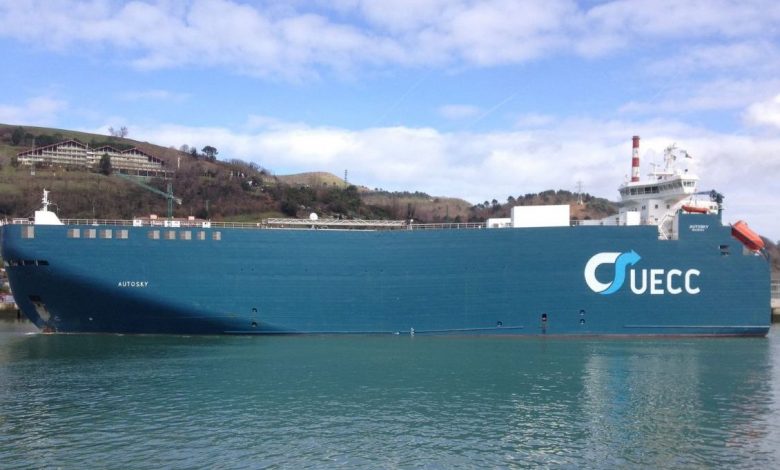Ships born again with ‘smoothie’ fuel

In a 12-month trial, United European Car Carriers (UECC) replaced conventional fuel with biofuel onboard the 20-year-old, 140 m long roro vessel Autosky. The results show how ageing assets can potentially be transformed into environmental frontrunners.
In March 2020 the 6,500 dwt car carrier, boasting a 2,080 vehicle capacity, started a trial. After a deep cleaning of its fuel tanks, and appropriate crew training, the vessel swapped conventional fuel for sustainably sourced biofuel. Provided by supplier GoodFuels, this green shipping “smoothie”, as UECC executives describe it, is made from a variety of food stocks, including processed cooking oil.
If biofuel is to succeed as a marine fuel, customers need to back it
The initial three-month pilot was extended to a year with support from BMW Group, a key UECC customer.
Over the course of the initiative Autosky used 6,000 tons of biofuel, reducing its overall CO2 (per ton-km) from 85.62g CO2/tkm in 2019 to 35.96gCO2/tkm, an almost 60% reduction in carbon intensity.
In total Autosky reduced CO2 emissions by 20m kg, equating to a reduction of around 9,000 kg of sulphur oxide and a near total elimination of particulate matter. As a result, UECC has now decided to continue with the use of biofuel for the vessel – which serves a short sea route calling Rotterdam, Zeebrugge, Santander and Pasajes – introduced it on another ship, and is now investigating the possibility of utilising bioLNG for its operations in the Baltic.
“We are committed to being at the front of shipping’s green transition and providing low emission or carbon neutral solutions. As we can see from this trial, that’s now viable on legacy tonnage,” commented Daniel Gent, energy and sustainability manager at UECC.
The UECC executive sees potential for greater uptake right across the industry – a move that can be accelerated with governmental incentives and buy in from cargo owners.
“This is key,” Gent said. “If biofuel is to succeed as a marine fuel, customers need to back it, embracing this simple, tried and tested solution as an excellent way to reduce the total lifecycle footprint of their goods. More and more cargo owners are focused on their own environmental goals throughout the value chain, as well as meeting demands of both society and other key stakeholders, so I think, as awareness grows, increasing numbers will come onboard.”

 . The results show how ageing assets can potentially be transformed into environmental frontrunners.
. The results show how ageing assets can potentially be transformed into environmental frontrunners.
It all depends what the biomass is made from, i.e. what was sacrificed to produce it. A recent controversial film ”Planet of the Humans” attacks the idea that it can be made out of trees, simply by knocking down hundreds of acres of forest to create biomass fuel. This is a deal with the devil. I am not surprised Michael Moore backs this film and biomass production. Lately he has gone completely loopy. The producers of this fuel should reveal what it is made from.
Hi Colin,
Very good points and questions that are at the core of our procurement decisions. Having strict sustainability criteria for the feedstocks used to make our fuel is vital. That’s why our fuel feedstocks cannot result in land use change, competition with food, deforestation or biodiversity loss and also have no higher application elsewhere in industry. Accountability and traceability is key – the feedstocks must be certified as sustainable and we need to be able to track the product through the whole supply chain to source.